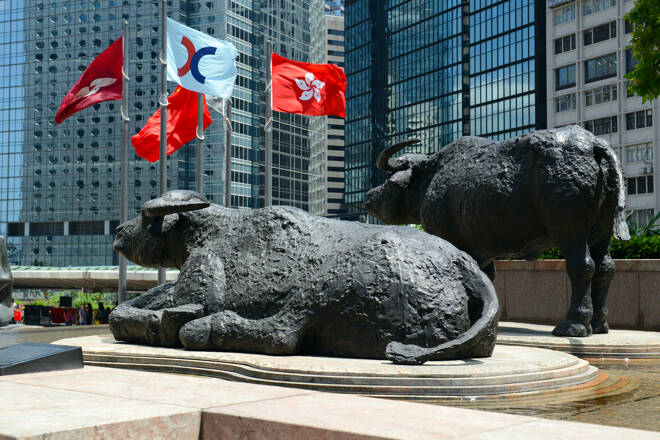Advertisement
Advertisement
Hang Seng Index, ASX 200, Nikkei 225: Nikkei has 40,000 in Sight
By:
Key Points:
- The Asian markets had a mixed end to the week. The ASX 200 ended the week on a high note, while the Hang Seng Index ended a three-day winning streak on Friday.
- House prices in China fell for the seventh consecutive month while the ASX 200 benefitted further from the NVIDIA Effect.
- On Monday, investors must consider central bank chatter as the markets hope for more stimulus measures from Beijing.
Overview of the Friday Session
The ASX 200 tracked the US equity market gains from the Thursday session. The Hang Seng Index ended the session in negative territory despite the CSI 300 Index closing the day in positive territory. The markets in Japan were closed for the emperor’s birthday.
Overnight US economic data and Fed commentary from Thursday, and the US market reaction to the NVIDIA (NVDA) earnings set the tone for the Friday Asian session.
The US Services PMI fell from 52.5 to 51.3 in February. Input price pressures softened while charge inflation accelerated. US initial jobless claims declined from 213k to 201k in the week ending February 17.
FOMC member Philip Jefferson warned about cutting interest rates too far. FOMC member Christopher Waller had more impact, suggesting the Fed should consider more inflation data to ensure inflation was moving toward the 2% target.
However, the US economic calendar played second fiddle to the NVIDIA Effect. After the US market closing bell on Wednesday, NVIDIA topped earnings forecasts, highlighting the influence of AI.
On Thursday, the Nasdaq Composite Index and S&P 500 rallied 2.96% and 2.11%, respectively. The Dow gained 1.18%.
The Asian economic calendar also drew investor interest on Friday. House prices in China declined at a more marked pace in January. Year-on-year, house prices were down 0.7% compared with 0.4% in December. House prices were down for the seventh consecutive month and saw the most marked decline since March 2023.
Central Banks and Corporate Earnings in Focus
On Monday, investors must consider the Friday US session. Recent US economic indicators and Fed commentary suggest a higher for longer Fed rate path. US labor market conditions remain tight, supporting wage growth amidst a sticky inflation environment.
The Nasdaq Composite Index declined by 0.28%, while the Dow and S&P 500 rose by 0.16% and 0.03%, respectively.
However, investors must monitor Bank of Japan and PBoC monetary policy chatter, fiscal stimulus news from Beijing, and corporate earnings.
On Friday, Moody’s withdrew credit ratings from Chinese developers. In December, Moody’s cut China’s sovereign rating in December.
On Monday, the ASX 200 and Nikkei futures were up 30 and 1,180 points, respectively.
ASX 200
The ASX 200 ended the Friday session up 0.42%. Tech and bank stocks were among the front-runners. Thursday gains for the Nasdaq Composite Index drove buyer demand for tech stocks. The S&P ASX All Technology Index (XTX) gained 1.36%.
The big four banks ended the Friday session in positive territory. National Australia Bank Ltd. (NAB) rose by 1.14%, with ANZ Group Holdings Ltd (ANZ) gaining 0.96%. The Commonwealth Bank of Australia (CBA) and Westpac Banking Corp. (WBC) ended the day up 0.33% and 0.27%, respectively.
Oil and mining stocks also ended the session in positive territory.
BHP Group Ltd (BHP) and Rio Tinto Ltd. (RIO) saw gains of 0.56% and 0.03%, respectively. Fortescue Metals Group Ltd. (FMG) ended the day up 1.37%.
Oil stocks Woodside Energy Group Ltd (WDS) and Santos Ltd (STO) rose by 0.03% and 0.95%, respectively.
However, Gold (XAU/USD) stocks bucked the trend. Northern Star Resources Ltd. (NST) and Evolution Mining Ltd. slid by 2.22% and 2.65%, respectively.
Hang Seng Index
On Friday, the Hang Seng Index ended the session down 0.10%. Investors locked in profits while waiting for fiscal stimulus policy measures from Beijing to bolster the Chinese economy.
The Hang Seng Tech Index (HSTECH) fell by 0.30%. However, property stocks rose for the fourth consecutive session. The Hang Seng Mainland Properties Index (HSMPI) gained 1.44%. Investors continued to react to the PBoC cutting the 5-year loan prime rate to 3.95%.
Alibaba (9988) and Tencent (0700) declined by 0.40% and 0.21%, respectively.
Bank stocks had another mixed session. HSBC (0005) continued to reel from the Q4 slump in profits. HSBC (0005) fell by 0.59%. China Construction Bank (0939) and Industrial Commercial Bank (1398) saw gains of 0.40% and 0.98%, respectively.
The Nikkei 225
(Graph for reference purposes only)
The markets in Japan were closed for the emperor’s birthday. Trading will resume on Monday, February 26.
For upcoming economic events, refer to our economic calendar.
About the Author
Bob Masonauthor
With over 28 years of experience in the financial industry, Bob has worked with various global rating agencies and multinational banks. Currently he is covering currencies, commodities, alternative asset classes and global equities, focusing mostly on European and Asian markets.
Advertisement
